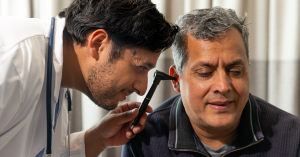With just a smartphone and a pair of headphones, you can now take a hearing test in the comfort of your own home. It sounds convenient—and for many people, it’s the first step in finally doing something about that nagging suspicion: “Is my hearing starting to go?”
As online health tools become more accessible, online hearing tests have exploded in popularity, offering a quick and free way to check your ears without stepping into a clinic. But here’s the real question:
Can you test your hearing online and actually trust the results?
The short answer? It depends.
In this article, we’ll explore how these tests work, how accurate they are, and when they’re a helpful tool vs a potential trap. We’ll also share what hearing professionals really think about them—and how to use them safely and effectively.
Because while your laptop might help detect a problem, it should never be the only voice you listen to when it comes to something as vital as your hearing.
How Online Hearing Tests Work
Online hearing tests have become increasingly sophisticated—and surprisingly accessible. But before you click “Start Test,” it’s worth understanding what these tests actually do, and what’s required to get a meaningful result.
Types of Tests and What They Measure
Most online hearing tests fall into one of two categories:
Pure Tone Tests
You listen to a series of beeps or tones at different pitches and volumes through headphones.
You indicate when you hear a sound by clicking or tapping.
The test builds a basic picture of your hearing thresholds (what you can and can’t hear) in each ear.
Speech-in-Noise Tests
These simulate real-world conditions by playing words or sentences with background noise.
You select what you think you heard from multiple choices.
This can assess how well you understand speech when there’s interference—a common struggle with age-related or mild hearing loss.
Some websites combine both, offering a more comprehensive screening in less than 10 minutes.
What You Need to Use Them Properly
To get the most accurate result from an online hearing test, you should:
Use good-quality headphones (not phone speakers or laptop audio)
Sit in a quiet room with minimal background noise
Follow setup instructions carefully (some tests require volume calibration)
Be honest in your responses—no guessing
Many tests are now optimized for desktops, tablets, and mobile devices, but for best results, use a computer with calibrated headphones.
Up next, we’ll explore just how accurate and trustworthy these tests really are.
How Accurate Are Online Hearing Tests?
Online hearing tests can feel reassuring—or alarming—depending on the results. But can you really rely on them to assess something as complex as your hearing? The answer is nuanced.
Strengths and Limitations
Strengths:
Convenient and fast: Most take 5–10 minutes and can be done at home.
Good for screening: They can highlight potential problems and prompt further testing.
Non-invasive and free: Many online tests don’t require registration or payment.
Useful first step: Great for people hesitant about seeing a specialist or unsure whether they have hearing loss.
Limitations:
Lack of medical oversight: No trained audiologist is present to interpret results.
Uncontrolled conditions: Background noise, poor headphones, or volume calibration errors can skew accuracy.
Basic scope: They only test a small portion of your hearing range and miss nuances like earwax, infections, or underlying medical conditions.
No diagnosis: These tests can’t tell the difference between conductive hearing loss (e.g. wax blockage) and sensorineural loss (e.g. nerve damage).
Think of them like a blood pressure cuff at the pharmacy: useful for spotting red flags, but not a replacement for a full check-up.
What Online Tests Can (and Can’t) Tell You
They CAN:
Alert you to hearing changes
Help monitor suspected issues over time
Encourage people to seek professional evaluation
They CANNOT:
Provide a clinical diagnosis
Detect the cause of your hearing loss
Customize treatment or recommend hearing aids accurately
Replace a comprehensive hearing test in a sound-treated room
Next, we’ll break down when it’s helpful to use an online hearing test—and when it might be risky to rely on one alone.
When Are Online Tests Useful vs Risky?
Online hearing tests can be a helpful tool—if used in the right context. But relying on them too heavily or misinterpreting their results can also delay proper diagnosis and care.
Self-Screening vs Diagnosis
Useful when:
You’re curious about your hearing and want a quick, low-pressure way to check
You suspect mild hearing loss and want a baseline before seeing a professional
You need a simple test to track changes over time (e.g. post-COVID hearing concerns)
You’re unsure whether it’s worth seeing an audiologist—online results can give you a reason
Risky when:
You experience sudden hearing loss or hearing in only one ear
There’s pain, drainage, dizziness, or other symptoms with your hearing issues
You have a history of ear infections, trauma, or tinnitus
You treat the test result as a definitive diagnosis, especially if it gives false reassurance
Online tests are not designed to replace comprehensive hearing evaluations, especially when symptoms are urgent or complex.
Red Flags That Mean You Need In-Person Help
If you experience any of the following, skip the online test and go straight to a clinic:
Hearing loss came on suddenly
You hear ringing, buzzing, or roaring in one or both ears
You’re having balance issues or dizziness
Your hearing fluctuates or worsens quickly
You notice hearing loss only in one ear
You’re struggling socially or emotionally due to communication difficulties
These signs often point to underlying medical conditions that online tests cannot detect or evaluate properly.
Next, we’ll look at what audiologists and experts actually think about online hearing tools—and how you can use them wisely.
Expert Opinions on Online Hearing Tools
Online hearing tests may be trending, but what do audiologists and hearing care professionals actually think about them? In short: they see value—but also have serious reservations.
What Audiologists Say
Most experts agree that online tests can be a useful first step, especially for people who:
Feel nervous about seeing a professional
Want to understand if their hearing has changed
Are curious but not ready to invest in full testing or hearing aids
However, audiologists also emphasize these limitations:
No test can replicate the accuracy of a clinical evaluation in a sound-treated booth
Online tests often miss low-frequency hearing loss, which can signal other conditions
They lack physical examination, meaning they can’t detect structural issues, infections, or earwax impaction
Results can be skewed by user error, poor equipment, or ambient noise
Combining Convenience with Clinical Care
Many hearing care providers are now embracing a hybrid model:
Offering telehealth consultations to interpret online test results
Using online screening to triage patients who need in-person care
Encouraging users to see online tools as a starting point—not the finish line
Some even partner with online test providers to help patients transition from screening to treatment, making the process smoother and less intimidating.
If you’re using an online test, experts recommend:
Taking it in a quiet environment with high-quality headphones
Viewing the result as informational, not diagnostic
Using it to start a conversation with a professional, not to replace one
Up next, we’ll guide you through how to safely test your hearing at home, and what to do with the results.
How to Safely Test Your Hearing at Home
If you’re curious about your hearing and want to try an online test, the good news is: you absolutely can—as long as you follow some basic best practices and know what to do next.
Best Practices for Reliable Results
To get the most accurate reading from an online hearing test, follow these steps:
Use high-quality headphones, preferably over-the-ear styles—not earbuds or built-in computer speakers.
Sit in a quiet room without background noise or distractions.
Follow any volume calibration instructions before beginning.
Choose a reputable platform, ideally one affiliated with hearing professionals (like NHS, RNID, or established hearing aid companies).
Take the test when you’re well-rested and alert—mental fatigue can skew results.
Be honest and attentive when responding. Don’t guess—if you don’t hear it, don’t click.
What to Do With Your Online Test Outcome
If the result shows normal hearing:
Great! But remember, online tests have limitations. Continue monitoring your hearing annually, especially if you’re over 50 or have risk factors.
If the result shows mild to moderate hearing loss:
Book a professional hearing evaluation for confirmation and more precise results.
Consider the test a conversation starter, not a conclusion.
Take note of specific situations where hearing is difficult—this can help your audiologist tailor recommendations.
If the result shows significant or sudden loss:
Contact a healthcare provider or audiologist immediately.
Avoid self-diagnosing or relying on online tests alone—sudden or severe hearing changes can indicate medical emergencies.
Online tools can empower you to take the first step, but don’t let convenience override care. The best outcomes come from pairing technology with professional expertise.
Conclusion: Online Hearing Tests Have a Place—But Know Their Limits
Online hearing tests are a convenient and accessible way to check in on your hearing health, especially if you’re unsure whether it’s time to see a professional. They can raise awareness, highlight potential problems, and serve as a useful first step toward better hearing.
But they’re not the whole story.
These tools can’t replace the depth, accuracy, or medical insight of a full audiological exam. If your online results suggest a problem—or if your ears are telling you something’s not right—follow up with a licensed hearing care professional. Trust the test, but also trust yourself to take the next step.
Because when it comes to hearing loss, the sooner you know, the more you can do.
Frequently Asked Questions
Are online hearing tests safe?
Yes, online hearing tests are safe to use as a screening tool. They pose no risk to your hearing or health. However, they should not be used to self-diagnose or replace a professional hearing test, especially if you’re experiencing sudden or severe symptoms.
Can they diagnose hearing loss?
No. Online hearing tests are designed to screen for potential hearing issues, not to diagnose the cause or type of hearing loss. A proper diagnosis requires an in-person evaluation by an audiologist, which includes physical examination and specialized equipment.
How should I prepare for an online test?
To get the most accurate results:
Use good-quality headphones
Find a quiet space
Calibrate your volume if prompted
Follow instructions closely and respond honestly
Avoid distractions or multitasking during the test
Are paid online tests better than free ones?
Not necessarily. Some paid platforms offer more detailed insights or access to follow-up support, but many free online tests are reliable for basic screening—especially if offered by trusted organizations. The key is choosing a reputable source, not just the price tag.
What do I do if the test shows a problem?
If the test suggests you may have hearing loss:
Don’t panic.
Schedule a full hearing evaluation with a licensed audiologist.
Make a list of situations where you struggle to hear, which can help guide the assessment.
Avoid delaying—early detection leads to better outcomes.
Is online testing suitable for children or seniors?
It can be—but with caution. Online hearing tests require:
The ability to follow instructions
Coordination to use a computer or device
A quiet environment and appropriate headphones
Children, older adults, or those with cognitive impairments may need assistance or in-person testing for accurate results.






